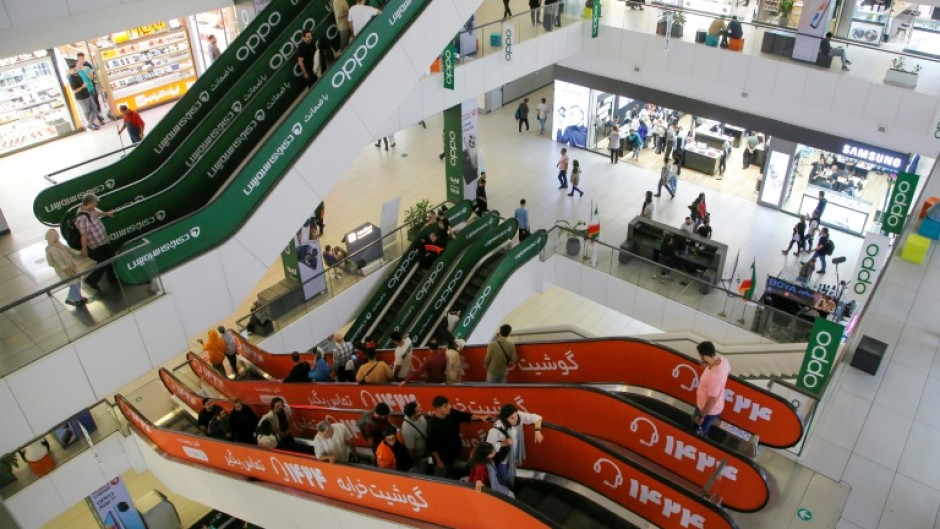TEHRAN - At a Tehran cafe, Hamid waves his mobile around hoping to latch onto a faint signal and thus bypass Iran's stringent ban on the latest models of iPhone.
He bought his new device abroad shortly after the Islamic republic banned 14 and 15 series iPhones in February 2023, hoping that the restrictions would eventually ease.
But they never did.
"I had network coverage for just a month but then it went away," the 32-year-old told AFP, repeatedly pressing his phone's power button to try to regain connectivity.
"I have to put it on lower 3G bands and maybe get coverage then."
Under last year's ban, users of the latest iPhone models are no longer allowed to register their devices in the country.
All individuals -- including tourists -- are required to register their phones with the authorities to be able to use local SIM cards for more than a month.
The ban has highlighted economic pressures Iran's government has been grappling with in recent years, including international sanctions and soaring inflation.
According to a March 2023 report by the ISNA news agency, the authorities have said the measure was aimed at cutting back on foreign currency spending.
But iPhones from US firm Apple remain highly coveted devices in Iran, valued not just for their advanced technology but also as status symbols.
- Underground market -
The official restrictions have inadvertently fuelled a lucrative underground market, with some vendors inflating the prices of older iPhone models that are easier to register.
Apple has never officially had a presence inside Iran because of US sanctions that were reimposed following Washington's 2018 withdrawal from a landmark nuclear deal.
And the ban even sparked a scheme that allegedly scammed thousands of Iranians out of tens millions of dollars for cheap iPhones.
A company called "Koroush" for months offered iPhones for discounted prices as low as 200,000 million rials ($340) through online ads featuring celebrities.
It allegedly raised around $35 million, according to the daily newspaper Javan in February. Other media outlets, quoting the police, reported lower figures of more than $3 million.
The company's owner is now on the run.
ISNA said that more than 5,000 people in Tehran and other cities have brought fraud cases against the company.
Those who sell iPhones in Iran say the scheme was just one way in which the ban has rattled the market.
"It has messed up the prices" of iPhone devices, said Navid, who owns a phone shop in central Tehran.
"It has also prevented customers from having a warranty for their overpriced phones," he added.
Despite being an older version, the price of the iPhone 13 is similar to that of newer models "because of the coverage it gets", said Arafeh, a 26-year-old photographer shopping for a new phone.
In some shops in Tehran, the price of an iPhone 13 ranged from 410 million rials to more than one billion rials ($710-$1,900), with the 15 series retailing for between 440 million rials and a billion rials ($750-$1,900).
- Growing hostility -
At one shop, the price of an iPhone 14 was between 366 million rials and 740 million rials ($640-$1,275).
Yet "people are still keen to buy iPhones", said Navid, who no longer puts the latest models on display because they are now "contraband".
Phones costing more than $600, including iPhones, accounted for nearly 32 percent of Iran's $4.4 billion worth of mobile phone imports between March 2021 and March 2022, according to a customs report cited by local media in September.
The authorities have over the years displayed a growing hostility towards American products.
In August 2020, supreme leader Ayatollah Ali Khamenei urged the government to stop importing iPhones.
"I've heard about half a billion dollars were spent on the import of one type of American luxury cell phone" between March 2019 and March 2020, he said in a 2020 speech according to his website.
"The private sector did this, but the government must stop it."
With the ban now in place, users of iPhone 14s and 15s have been left with little option but to find illicit and often costly ways to gain network access.
"It's the only option I have to get the phone working," said Hamid.
Vendors and software technicians charge between "four million rials and 70 million rials" to alter some network parameters to try and bypass the limitations, according to Navid.
Mehdi, a 26 year-old-engineer, has struggled for months to find ways around the ban.
"And none of the solutions are permanent," he said.
- by Ramin Khanizadeh

